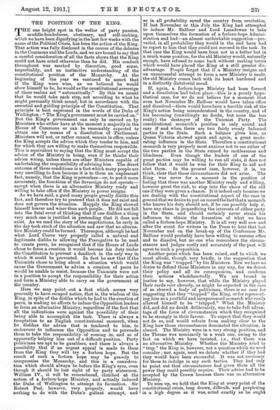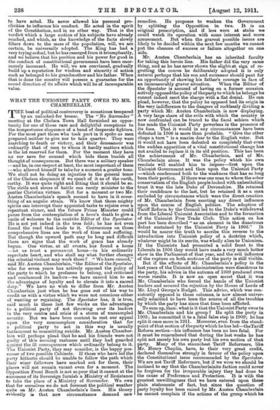THE POSITION OF THE KING. T HE one bright spot in
the welter of party passion, muddle-headedness, obstinacy, and self-seeking, which we have been dignifying in the last few weeks with the name of the Political Crisis, has been the action of the King. That action was fully disclosed in the course of the debates in the Commons and the Lords, and we are bound to say that a careful consideration of all the facts shows that the King could not have acted otherwise than he did. His conduct throughout was marked by discretion, good sense, impartiality, and an instinctive understanding of the constitutional position of the Monarchy. At the beginning of the year we ventured to assert that if the King were wise, as we believed he would show himself to be, he would as the constitutional sovereign of these realms act " automatically." By this we meant that he would take each step, not according to what he might personally think sound, but in accordance with the essential and guiding principle of the Constitution. That principle is best expressed in the words of the Duke of Wellington : " The King's government must be carried on." But the King's government can only be carried on by Ministers who either have at the moment a majority in the House of Commons or can be reasonably expected to obtain one by means of a dissolution of Parliament. Ministers will not, or rather cannot, remain in office, unless the King accepts the advice which they tender to him, and for which they are willing to make themselves responsible. This is equivalent to saying that the King must accept the advice of the Ministry in being, even if he thinks their advice wrong, unless there are other Ministers capable of undertaking the responsibility of advising him. The direct outcome of these conditions is a fact which many people are very unwilling to face because it is to them an unpleasant fact, namely, that the King is powerless—or, to put it more accurately, the functions of the Sovereign do not operate— except when there is an alternative Ministry ready and willing to take office if the Ministry in power resigns. As we have said, a good many people greatly dislike this fact, and therefore try to pretend that it does not exist and does not govern the situation. Happily the King showed himself braver and wiser than such people. He did. not fall into the fatal error of thinking that if one dislikes a thing very much one is justified in pretending that it does not exist. As we read the story of the negotiations, he early in the day took stock of the situation and saw that no alterna- tive Ministry could be formed. Thereupon, although he had what Lord Crewe very properly called a natural and legitimate dislike to allowing the Prerogative to be used to create peers, he recognized that if the House of Lords chose to force a creation it would become his duty under the Constitution to prevent a deadlock in the only way in which it could be prevented. In fact he saw that if the Unionists chose to bring about a situation which would cause the Government to advise a creation of peers he would be unable to resist, because the Unionists were not in a position to accept the responsibility for their action and form a Ministry able to carry on the government of the country.
Here we may point out a fact which seems very generally to have escaped notice, that is, the wisdom of the King, in spite of the dislike which he had to the creation of peers, in making no efforts to induce the Opposition leaders to form an alternative Ministry, regardless of the fact that all the indications were against the possibility of their being able to accomplish the task. There is always a temptation to an English constitutional monarch, when he dislikes the advice that is tendered to him, to endeavour to influence the Opposition and to persuade them to take the responsibility of coming in, and so of apparently helping him out of a difficult position. Party politicians are apt to be gamblers, and there is always a possibility that if an urgent appeal is made to them from the King they will try a forlorn hope. But the result of such a forlorn hope may be gravely to compromise the Monarchy, and this is a considera- tion which should always be before the King's eyes, even though it should be lost sight of by party statesmen. William IV., it will be remembered, clutched at the notion of a forlorn-hope Ministry, and actually induced the Duke of Wellington to attempt its formation. Sir Robert Peel, however, very properly, would have nothing to do with the Duke's gallant • attempt, and so in all probability saved the country from revolution. If last November or this July the King had attempted to induce Mr. Balfour and Lord Lansdowne to take upon themselves the formation of a forlorn-hope Admini- stration and had—an almost unthinkable suggestion—pre- vailed, in all probability they would in the end have had to report to him that they could not succeed in the task. In that case the King would have been not in a better but in a much worse position, for the old Ministry would, naturally enough, have refused to come back without making terms which would have placed the King at a still greater dis- advantage. People forget that if a Ministry resigns and an unsuccessful attempt to form a new Ministry is made, the old Ministry comes back with its heart hardened and in a distinctly dictatorial mood.
If, again, a forlorn-hope Ministry had been formed and a dissolution had taken place—this is a purely hypo- thetical case, for we do not believe for a moment that even last November Mr. Balfour would have taken office and dissolved—there would have been a terrible risk of the King's action being misunderstood in the country, and of his becoming (unwillingly no doubt, but none the less really) the destroyer of the Unionist Party. The constitutional monarch's position is only sound and easy if and when there are two fairly evenly balanced parties in the State. Such a balance gives him, as Queen Victoria showed again and again, a great mode- rating influence in the State. Therefore a constitutional monarch is very properly most anxious not to see either of the two parties in the State ruined by recklessness and blindness. Even though the leaders of one of the great parties may be willing to run all risks, it does not follow that it would be wise for their King to aid and abet them. In the present case, however, it is, we think, clear that these circumstances did not arise. The King was never for a moment in the position of feeling that there was another Ministry ready and willing, however great the risk, to step into the shoes of the old one if they were given a chance. It is indeed only because we are dealing with the constitutional aspect of the case in general that we desire to put on record the fact that a monarch who knows his duty should not, if be can possibly help it, have any share in jeopardizing the interests of either party in the State, and should certainly never strain his influence to obtain the formation of what we have called a forlorn-hope Ministry. It is all very well now and after the event for writers in the Press to hint that last November and on the break-up of the Conference Mr. Balfour would probably have been willing to assume office and to dissolve, but no one who remembers the circum- stances and judges coolly and accurately of the past will agree to such a proposition.
Another point which has been raised, and to which we must allude, though very briefly, is the suggestion that the King was " trapped " by his Ministers. Now we have no desire to defend those Ministers in any way, for we detest their policy and all its consequences, and condemn their actions wholeheartedly. We are bound in justice to say, however, that while the Ministry played their cards very cleverly, as might be expected in the case of so shrewd a body of politicians, there is no case for suggesting that they "trapped" the King, or for represent- ing him as a youthful and inexperienced monarch who easily allowed himself to be "trapped." What the Ministry did, and did no doubt deliberately, was to take full advan- tage of the force of circumstances which they recognized to be strongly in their favour. To expect that they would not do so, and would refrain from making clear to the King how those circumstances dominated the situation, is absurd. The Ministry were in a very strong position, and the Throne was necessarily in a weak one, owing to the fact on which we have insisted, i.e., that there was no alternative Ministry. Whether the Ministry tried to " trap " the King is, however, not a question which we need consider ; nor, again, need we debate whether if they had they would have been successful. It was not necessary for them to indulge in any such tactics. They had only to point out that circumstances had given them all the power they could possibly require. Their advice had to be accepted by the Crown because there was no alternative Ministry. To sum up, we hold that the King at every point of the constitutional crisis, long drawn, difficult, and perplexing in a high degree as it was, acted exactly as he ought to have acted. He never allowed his personal pro- clivities to influence his conduct. He acted in the spirit of the Constitution, and in no other way. That is the verdict which a large section of his subjects have already reached, and which, as the knowledge of the facts slowly filters down to the mass of the population, will, we are certain, be universally adopted. The King has had a very trying ordeal, but he has emerged from it triumphantly, and we believe that his position and his power for good in the conduct of constitutional government have been enor- mously increased. He will, we are convinced, gradually build up a reputation for wisdom and sincerity of action such as belonged to his grandmother and his father. When that is done the country will possess a guarantee for the sound direction of its affairs which will be of incomparable value.



































 Previous page
Previous page